Vietnam National Children’s Hospital has successfully performed its first liver transplant from a brain-dead donor for a 3-year-old pediatric patient with congenital biliary atresia. The surgery was conducted using an organ donated by a brain-dead individual at Can Tho Central General Hospital. The success of this transplant results from collaboration among hospitals, the National Organ Transplant Coordination Center, and supporting units, all working together to quickly save the life of the 3-year-old girl from Hung Yen.
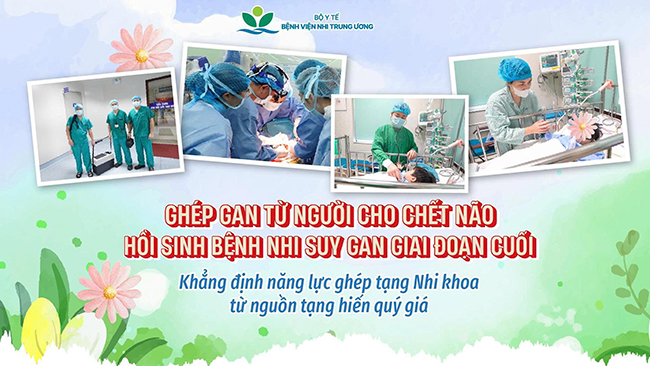
The pediatric patient was diagnosed with biliary atresia shortly after birth and underwent Kasai portoenterostomy (surgery to treat biliary atresia) at $2.5$ months of age. However, after more than two years, the liver’s bile drainage function gradually declined, and severe cirrhosis progressed, putting the child in a critical condition. Therefore, doctors determined that a liver transplant was the only chance to save the child’s life.
At the Vietnam National Children’s Hospital, the number of children with severe hepatobiliary diseases requiring liver transplantation is increasing. Meanwhile, the source of donated livers for children remains very limited. Liver donations from living donors—often the patient’s parents or relatives—are still the main option. However, in this patient’s case, despite screening many family members, a suitable donor for a liver segment could not be found.
On November 13, 2025, Vietnam National Children’s Hospital received a notification from the National Organ Transplant Coordination Center about a case at Can Tho Central General Hospital, where the family of a brain-dead patient had agreed to donate organs, including the left lobe of the liver, which was a match for the pediatric patient. This represented a valuable ray of hope in a desperate situation.
The team traveled almost 2,000 miles overnight to receive the donated liver.

“Immediately after receiving information about the organ donation source from a brain-dead donor at Can Tho Central General Hospital, we quickly held consultations and activated all specialized teams. On the night of November 13th, the hospital sent a team to Can Tho to pick up the donated liver. With the support of the National Organ Transplant Coordination Center, close collaboration with Military Central Hospital 108 and Can Tho Central General Hospital, and assistance from Traffic Police and Vietnam Airlines, every step was carried out efficiently to reduce the time needed to transport the organ to Hanoi. At the same time, Vietnam National Children’s Hospital carefully prepared, establishing strict protocols for each stage—pre-, intra-, and post-surgery—to guarantee the quality of the graft and the success of the operation.”
Racing against time, they performed a liver transplant just in time to save the child’s life.
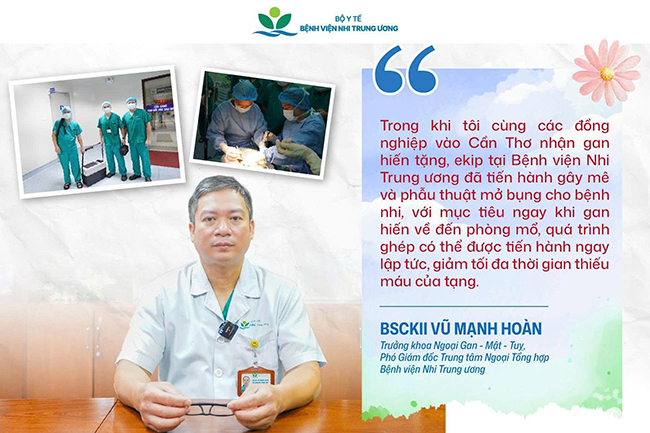
“While my colleagues and I traveled to Can Tho to retrieve the donated liver, the team at the Vietnam National Children’s Hospital proceeded with anesthesia and laparotomy (open-abdominal surgery) for the child patient, aiming that as soon as the donated liver arrived in the operating room, the transplant process could begin immediately, minimizing the cold ischemia time of the organ.”
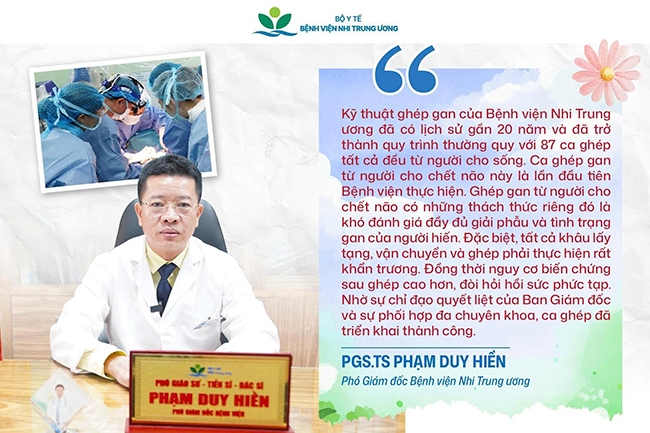
“The liver transplant technique at the Vietnam National Children’s Hospital has a history of nearly 20 years and has become a routine procedure, with 87 cases all performed from living donors. This deceased-donor liver transplant case is the first the Hospital has ever performed. Deceased-donor transplants present unique challenges, such as the difficulty in fully assessing the anatomy and condition of the donor’s liver. Crucially, all steps—organ retrieval, transportation, and transplantation—must be carried out very urgently. Furthermore, the risk of post-transplant complications is higher, demanding complex intensive care. Thanks to the decisive leadership of the Board of Directors and the multidisciplinary coordination, the transplant was successfully deployed.”
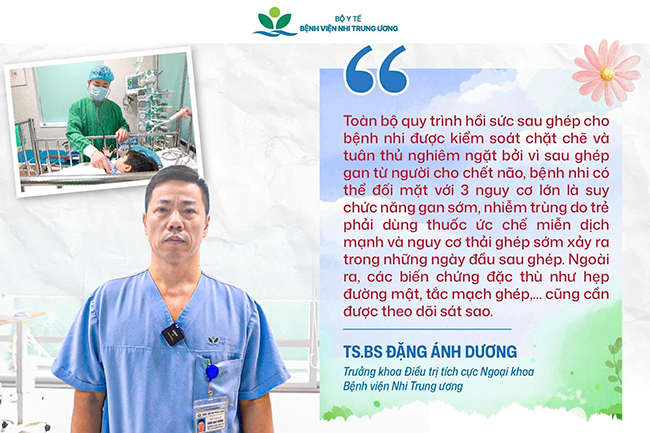
“The entire post-transplant resuscitation process for the child patient is carefully controlled and closely monitored because, following a deceased-donor liver transplant, the child may face three main risks: early liver dysfunction, infection caused by the necessary strong immunosuppressive drugs, and the risk of early rejection occurring in the initial days after transplantation. Additionally, specific complications such as bile duct stricture, graft vascular occlusion,… also require vigilant monitoring.”
After the surgery, the child was transferred to the Surgical Intensive Care Unit for monitoring.
The encouraging news is that by the 6th day of transplantation, the graft connection and the child’s liver function are progressing favorably. The child is breathing spontaneously, hemodynamic stability is maintained, they are conscious, no longer jaundiced, and have begun to be fed again.
Organ Donation Saves Lives – Giving Lasts Forever
The success of the first deceased-donor liver transplant at the Vietnam National Children’s Hospital not only offers a chance at life for this three-year-old girl but also opens up further hope for many children with end-stage liver failure. Every donated liver, kidney, or heart brings a new chance at life for patients standing at the threshold of life and death. For children, this is even more meaningful, because after every successful transplant lies a rewritten future, a life resurrected through the compassion of the donor and their family, coupled with the dedication and efforts of the doctors and medical staff.
The Vietnam National Children’s Hospital respectfully extends its deepest gratitude to the donor’s family for their noble gesture and hopes that more compassionate individuals will join hands to support humanitarian organ donation, so that more chances at life can be given.
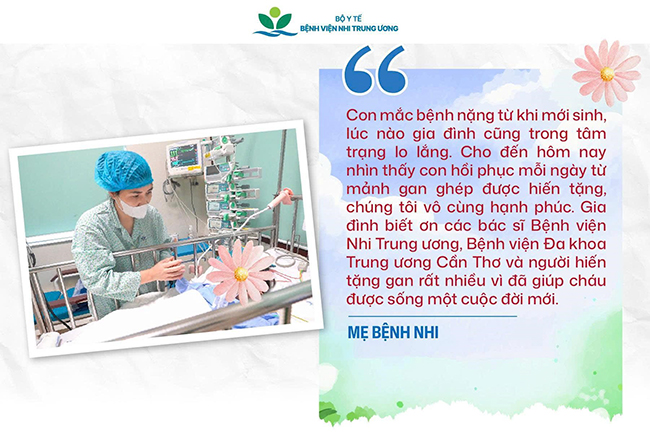
“Our child has had a serious illness since birth, and our family was always worried. Today, seeing our child’s recovery day by day thanks to the donated liver graft makes us incredibly happy. We are deeply grateful to the doctors at the Vietnam National Children’s Hospital, Can Tho Central General Hospital, and the liver donor for helping our child start a new life.”


